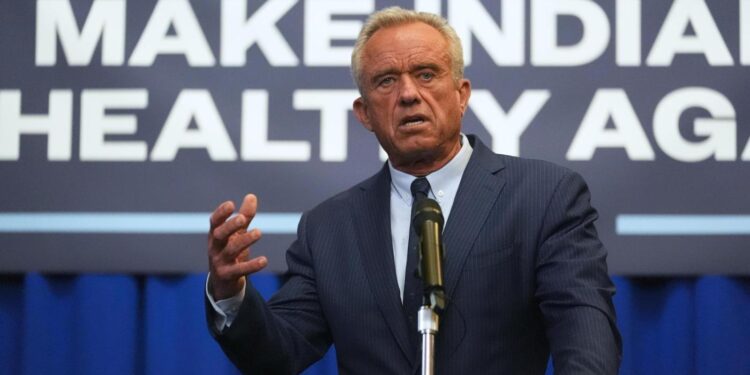
A new Indiana initiative — supported by national leaders — will help change a culture of promoting chronic disease through how food is produced, said Gov. Mike Braun.
However, federal cuts might pose a challenge to achieving that goal.
“This isn’t just a usual, top-down, one size fits all public agenda,” Braun said at a Tuesday press conference in Indianapolis where he announced nine executive orders as part of a “Make Indiana Healthy Again” agenda. “We’re focused on root causes, transparent information and real results. We’re taking on big issues, like diet-related chronic illness.”
U.S. Health and Human Services Secretary Robert F. Kennedy, Jr. and Administrator of Centers for Medicaid and Medicaid Services Mehmet Oz joined Braun to announce changes through the “Make Indiana Healthy Again” initiative.
Braun’s executive order actions include overhauling work requirements for SNAP to fill open jobs; cutting down on “fraud and abuse” of the program by reinstating income and asset verification; changing federal rules so states can operate “high-quality, entrepreneurial SNAP programs; removing candy and soft drinks from SNAP benefits; addressing concerns with possible negative effects of food dyes; creating of a comprehensive study of diet-related chronic illness; increasing access to direct-to-consumer food from local farms; establishing the Governor’s Fitness Test and School Fitness Month; and cutting down on Medicaid program eligibility errors.
Braun thanked Kennedy and Oz for their support.
“You’re setting the stage at the federal level,” Braun said. “We’re going to be your best ally at the state level.”
Oz said health care costs are rising throughout the country, and taking preventive measures will be the best way to decrease those costs.
“Health care expenses in this country are increasing at two to three times faster than the economy,” Oz said. “Effectively, we have now generated a health care system … that’s not healthy long-term.”
Kennedy said American children are “damaged” by chronic diseases, including diabetes. He also called autism a disease, but the Centers for Disease Control and Prevention call it a disorder and specific causes are not yet known.
Although Braun, Kennedy and Oz all said fresh foods from local farms must be prioritized, the U.S. Department of Agriculture recently canceled more than $1 billion in funds for schools and food banks to purchase foods directly from local farmers, according to Post-Tribune archives.
The NWI Food Bank received notice that the department cut from the food bank $400,000 worth of food delivery from the Emergency Food Assistance Program, according to Post-Tribune archives.
“We were getting ground beef free-of-charge, and now, at $10 a pound, we can’t afford that, but I refuse to lower my food standards,” said River Forest Community School Corporation’s Food Service Director Nick Alessandri about the Local Food in Schools program. “Because students are enjoying the food we’re making, meal participation has gone up. Cutting funding is just absurd.”
Attorney General Todd Rokita and Lt. Gov. Micah Beckwith both expressed support for Braun’s executive orders Tuesday.
Arkansas and Indiana are the first states to ask the Trump administration to remove items — including soft drinks and candy — from SNAP, according to the Associated Press. One of Braun’s executive orders claimed that soft drinks are the number one commodity purchased with SNAP benefits, but a USDA study from 2016 showed soft drinks comprise around 5% of each dollar spent in SNAP and candy amounts to 2%. The vast majority — 80% — is spent on meat, fruits, vegetables, rice, beans, eggs, dairy and prepared foods.
Antihunger groups oppose SNAP food restrictions, saying that research shows that program participants are no more likely than other low-income Americans to buy sugary drinks or snack foods, according to the Associated Press. Limiting food choices undermines the autonomy and dignity of people who receive a benefit of about $187 per month — or about $6.20 per day.
Braun, Kennedy and Oz didn’t mention the more than 700 measles cases that have been diagnosed across the U.S. until answering questions. The Indiana Department of Health reported the state’s first confirmed case of measles on April 7 in Allen County, which had six cases by Wednesday.
Indiana, Kansas, New Mexico, Ohio, Oklahoma and Texas have active measles outbreaks.
The Centers for Disease Control and Prevention has done “a very good job” of controlling the outbreak, Kennedy said.
He encourages doctors to know how to treat measles because “we can’t simply rely on the vaccine.”
“There are people that get measles because they don’t vaccinate, and there are people who get the measles because the vaccine wanes,” Kennedy said. “That’s basically a leaky vaccine, and that problem is always going to be around.”
The National Foundation for Infectious Diseases said the vaccine is 97% effective after two doses, according to its website. Most vaccinated adults are immune to measles and do not need further vaccines, according to the foundation.
Texas first reported a measles death in February, a school-aged child who was unvaccinated, according to the Associated Press; The second child who died was also unvaccinated. A New Mexico adult who was unvaccinated died after having measles in March.
Porter County Health Officer Rodney Guimont said in an email that the “Make Indiana Healthy Again” initiative focuses on improving nutrition, reducing chronic diseases, and increasing transparency in health care aligns with “pressing public needs in Indiana.”
Although the executive orders align with Hoosier needs, Guimont said the requirement for federal approval of SNAP changes introduces uncertainty.
“With the Health First Indiana Initiative we are addressing several community health concerns already with our community health partners,” Guimont said. “We hope people will get involved and ‘get moving’ to promote exercise/activity, well-being, and mental health. Preventative measures can be extremely successful and impactful if implemented correctly and (Hoosiers) willingly participate. While measurable outcomes like reduced obesity or chronic disease rates will take years to assess, the importance of shifting dietary habits and promoting exercise and overall health and well-being remains key.”
Guimont did not comment on Kennedy’s measles vaccine remarks.
Representatives from the Lake County health department were unable to immediately comment on the “Make Indiana Healthy Again” initiative and Kennedy’s measles comments.







